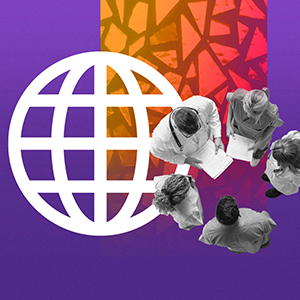Institute for Jewish-Catholic Relations
Promoting Interfaith Relations

The lawn in front of the Chapel of St. Joseph was filled with mourners following the 2018 Pittsburgh synagogue shooting that left 11 congregants dead. Notably, recalls Philip Cunningham, PhD, professor of theology, nearly half of those attending the service of interreligious solidarity were from the local Jewish community.
“There are probably a dozen synagogues within a five-mile radius, but folks came up to me and said that it was really important for them to feel support and comfort from the Catholic community — that to come to a Catholic campus was a whole different level of friendship,” says Cunningham, director of the University’s Institute for Jewish-Catholic Relations (IJCR).
That day and its location — in front of the University’s “Synagoga and Ecclesia in Our Time” statue, which was blessed by Pope Francis — poignantly underscore the Institute’s mission to deepen understanding and build new relationships between the Jewish and Catholic communities.
Founded in 1967, IJCR was established two years after the Second Vatican Council issued Nostra Aetate, a declaration that called for, among other things, “mutual understanding and respect … as well as fraternal dialogues” between Christians and Jews. Since that time, the Institute — the University’s oldest — has become known both locally and internationally for its studies, lectures, coursework and teachings about interfaith relations.
This year, Cunningham and IJCR Co-Director Adam Gregerman, PhD, spearheaded a study that looked at American Catholics’ feelings toward Jews and Judaism. The survey revealed that 89.4% of American Catholics had “very good,” “good” or “neutral” opinions toward Jews, among other data.
While the survey was conducted prior to the ongoing Israel-Hamas war, the directors see the Institute playing a role in the vigilance against displays of both antisemitism and Islamophobia, including the planning of a national dialogue with interreligious leaders.
“Through the Dialogika website, which we oversee, we also have a repository of relevant statements and writings on Jewish-Christian relations,” explains Gregerman, a professor of theology.
In addition to being a voice against antisemitism through various publications and events, the Institute is also part of an international research collaboration, “Christ Jesus the Jew: The Importance of his Jewish Identity for Christians and for Jews Today.”
“Our ongoing research project on Jesus's Jewishness is exciting for a lot of reasons. It's a chance to have dialogue and discourse with colleagues around the world and Phil and I are involved in shaping those ideas,” says Gregerman.
“The ‘international’ part is hugely significant,” adds Cunningham. “The situations in Europe and the U.S. and Israel are very different demographically and historically. We need to bounce ideas off of each other, internationally and interreligiously. Few others are doing this on a sustained basis.”
Our ongoing research project on Jesus's Jewishness is exciting for a lot of reasons. It's a chance to have dialogue and discourse with colleagues around the world and Phil and I are involved in shaping those ideas.”
Adam Gregerman, PhD
Professor of Theology and IJCR Co-Director


